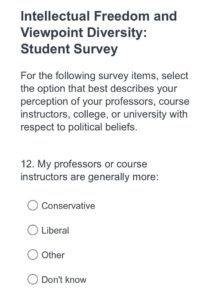
An “intellectual freedom and viewpoint diversity” survey was required to be sent out to all students and faculty of public universities and colleges in Florida. The survey has caused controversy with some students and faculty within Florida’s postsecondary education institutions.
The survey stems from Florida House bill 233, signed by Florida Gov. Ron DeSantis last June. Two versions of the survey were sent out to students and faculty, and responses are voluntary and anonymous.
According to the Florida Senate website, Florida House bill 233 “Prohibits State Board of Education and Board of Governors from shielding students, staff, and faculty from certain speech and requires State Board of Education to conduct annual assessment on intellectual freedom & viewpoint diversity.”
The survey asks questions about political viewpoints and states that the goal is to discover the extent to which all viewpoints are welcomed in campus classrooms.
“We want our universities to be focused on critical thinking and academic rigor. We do not want them as basically hotbeds for stale ideology,” said DeSantis at a news conference in reference to the bill last June. “That’s not worth tax dollars and not something we’re going to be supporting moving forward.”
In an interview with the Tallahassee Democrat, J. Andrew Gothard, president of the United Faculty Florida Union (UFF), claimed that the survey violated the privacy of faculty and students in higher education.
“Florida’s government has no right to know the thoughts, feelings, or political or religious beliefs of anyone,” said Gothard. “Including the higher education community.”
The UFF filed a federal lawsuit against the state of Florida regarding the HB 233 bill. Florida’s motion to dismiss the lawsuit was denied.
Na’Tasha Morgan, an interdisciplinary studies student at Florida A&M University, said she doesn’t think the survey is fair because college students should be able to have opinions without being monitored.
“I don’t feel like it’s needed,” said Morgan . “I went to two historically Black colleges and when it comes to what we talk about in our spaces, we share our experiences and our opinions about racism.”
Some students are choosing to not answer the survey since participation in the survey is voluntary.